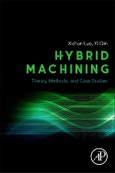Hybrid Machining: Theory, Methods, and Case Studies covers the scientific fundamentals, techniques, applications and real-world descriptions of emerging hybrid machining technology. This field is advancing rapidly in industrial and academic contexts, creating a great need for the fundamental and technical guidance that this book provides. The book includes discussions of basic concepts, process design principles, standard hybrid machining processes, multi-scale modeling approaches, design, on-machine metrology and work handling systems.
Readers interested in manufacturing systems, product design or machining technology will find this one-stop guide to hybrid machining the ideal reference.
Please Note: This is an On Demand product, delivery may take up to 11 working days after payment has been received.
Table of Contents
1. Introduction to hybrid machining technology2. Overview of hybrid machining processes
3. Assisted hybrid machining processes
4. Combined hybrid machining processes
5. Multi-scale modelling hybrid machining
6. Hybrid machine tool design
7. On-machine metrology for hybrid machining
8. Material handling for hybrid machining
9. Future of hybrid machining technology








